From Rocky to Creed (And Every Round In Between) | A Review of the Most Famous Boxing Series in Film
The Rocky movies are one of those cultural touchstones that everyone is aware of on some subconscious level, even if they’ve never actually sat down and watched one. Most people know what an ‘80s training montage’ is. The Eye of the Tiger. Mr. T. Apollo Creed. Sylvester Stallone. Calling out ‘Adriaaaann!’ (or the similar ‘Yo Adrian! I did ittttt!). For forty years now, the lovably formulaic series has captured our hearts in a way that few other sports movies have managed. Certainly there are better boxing films than Rocky or any of its sequels (the fact that the 1976 original won ‘Best Picture’ and Raging Bull didn’t is still a matter of contention for snobs everywhere) but even when those films are superior in quality, they nevertheless draw comparisons with the Italian Stallion’s sculpted, protein-packed legacy.
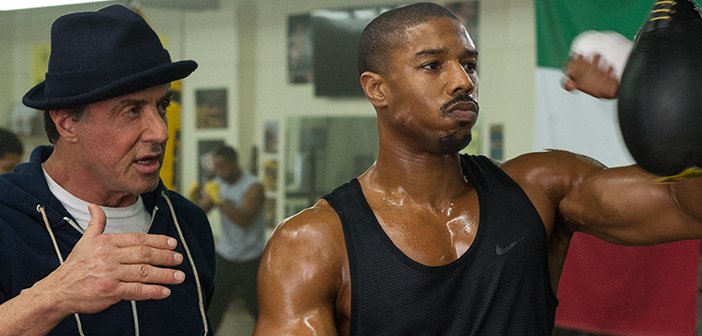
My own experience with the franchise is almost accidental. Having remembered the essential bits and bobs of the films from catching pieces of them on various Saturday evening RTÉ ‘Big, Big Movie’ broadcasts, I happened upon the complete (at the time) DVD boxset of Rockys 1-5 for the bargain price of 30 quid. I had a few vouchers I was looking to use up, a few holidays left and Stallone’s pseudo-comeback Rocky Balboa (Rocky VI for those of us who kept count) was soon to be released. Why not? This resulted in a great love for an emotional rollercoaster, a drama-soaked, action-packed, schmaltz-stained, redemptive road paved by five films varying from epic to mundane in literal and metaphorical terms.
With the release of Creed, I decided it would be just splendid to blitz my way through the ‘Rocky’ franchise in more or less one sitting. This actually isn’t as strenuous as one might think – leaving aside the fact that every one of the films is at least quite entertaining, Rockys II-VI are never longer than 110 economic minutes. Only the first film is two hours long. So really it wasn’t any worse than a Netflix binge-watch.
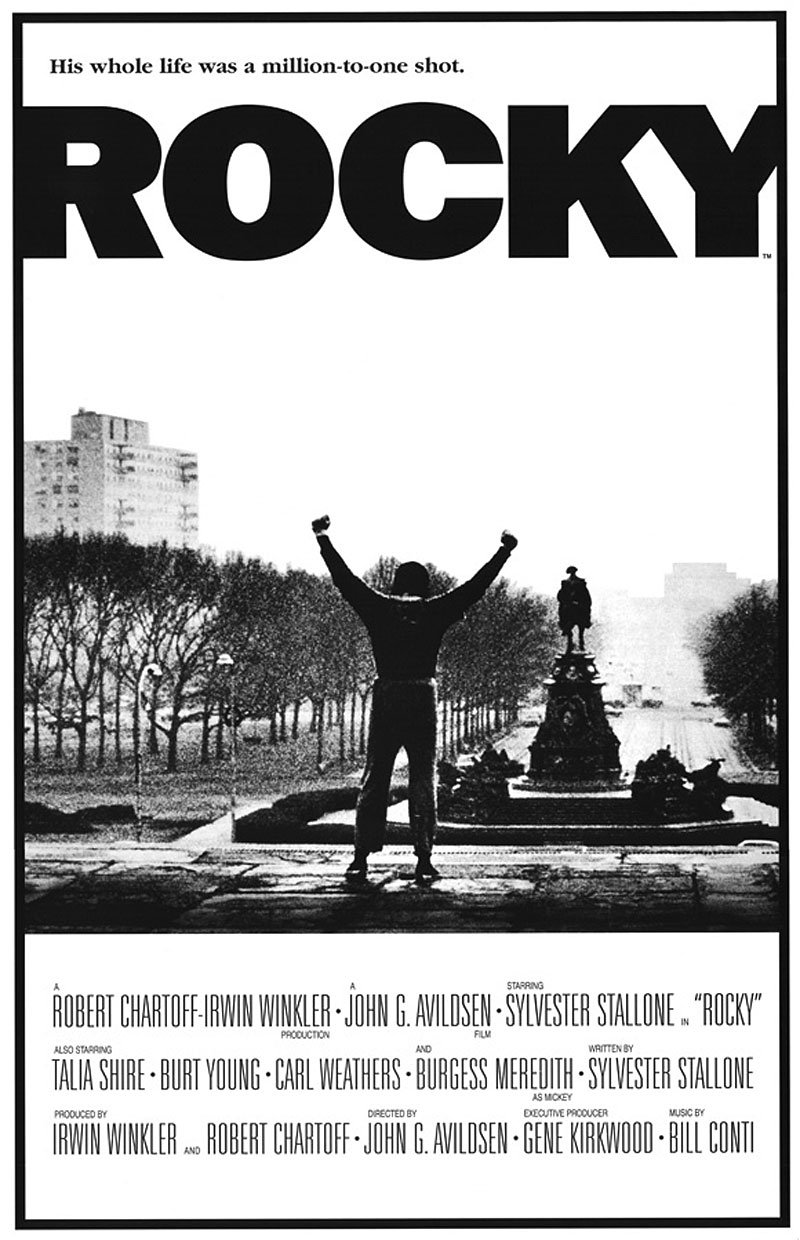
The first Rocky is undoubtedly the best film of the series and still one of the greatest films ever made. For a series so often criticised for its formula, I’m always surprised by how little the first outing actually adheres to it. Most of the film is spent establishing the characters and the Philadelphia backdrop. Very little time is actually spent in the boxing ring and the sweet science is given little or none of the glamour or machismo it would receive in the later films. Rocky is introduced as a lovable simpleton, unable or unwilling to try his hand at any career that doesn’t involve getting pummeled in the ring or acting as a would-be thumb-breaker for the local loan-shark mafioso – a job he’s not particularly good at (when faced with a dock-worker who has defaulted on his loan, Rocky opts not to break his thumbs because if he gets laid off, he won’t be able to pay the fee). Despite his jovial manner and his boy scout approach to life in poverty, throughout the first act or so, we get a sense of Rocky’s crippling self-doubt. He’s sickened by a photograph of himself as a boy. His boxing trainer (the Earth-shattering Burgess Meredith) hates him for never applying himself. He has to think up a new joke to chat to the shy pet-shop worker Adrian (the deceptively beautiful Talia Shire) because he’s no good at ordinary conversation. When the chance of a lifetime comes in the form of a freak shot at the heavyweight championship, Rocky initially declines because he doesn’t want to make a fool of himself. The film also follows the growth of his lover Adrian, an almost-mute 9-5er who is trapped under the thumb of her brother, a forgotten veteran and functioning alcoholic, Paulie. Paulie is disgusted by the sight of her and clearly vents all of his self-loathing on her and blames her for his life never going anywhere. Even the film’s defacto ‘villain’ Apollo Creed is just a guy trying to create a great show and give some gimmicky prizefighter a great opportunity. If I can be permitted to spoil a 40-year old film, Rocky ‘going the distance’ and accepting a brutal beating from the world champion is more breathtakingly satisfying than any of the bland, outright victories of the sequels. It’s not a perfect film – there’s some really dated moments of 70s sexism (Rocky’s ‘seduction’ of Adrian is uncomfortable to watch in 2015) and it was described at the time as ‘pure schmaltz’ which some may find difficult to disagree with. For others, it’s Americana at its best, lovingly brought to life by director John Avildsen, with one of the most heartwarming lead performances since the films of Frank Capra. Yes, Taxi Driver is better, but Rocky still deserved ‘Best Picture’.
Rocky II is a utilitarian ‘very good sequel’, no where near as genuine or necessary as the first film, but still reasonably heartfelt and plausible enough as a conclusion to the plot of the first film. In typical 1970s style, the film opens mere minutes after the first, creating a strong continuity strand between the two (for better or worse). The pacing is a little bit clunkier, the dramatic moments are a little bit more forced and while the fighting is more polished, the dialogue and the atmosphere feel far less natural. Nevertheless, it’s still quite a nice film and arguably among the better of the sequels. The ending is a lot of fun and people forget how many of the iconic series moments actually come from this film rather than the first.
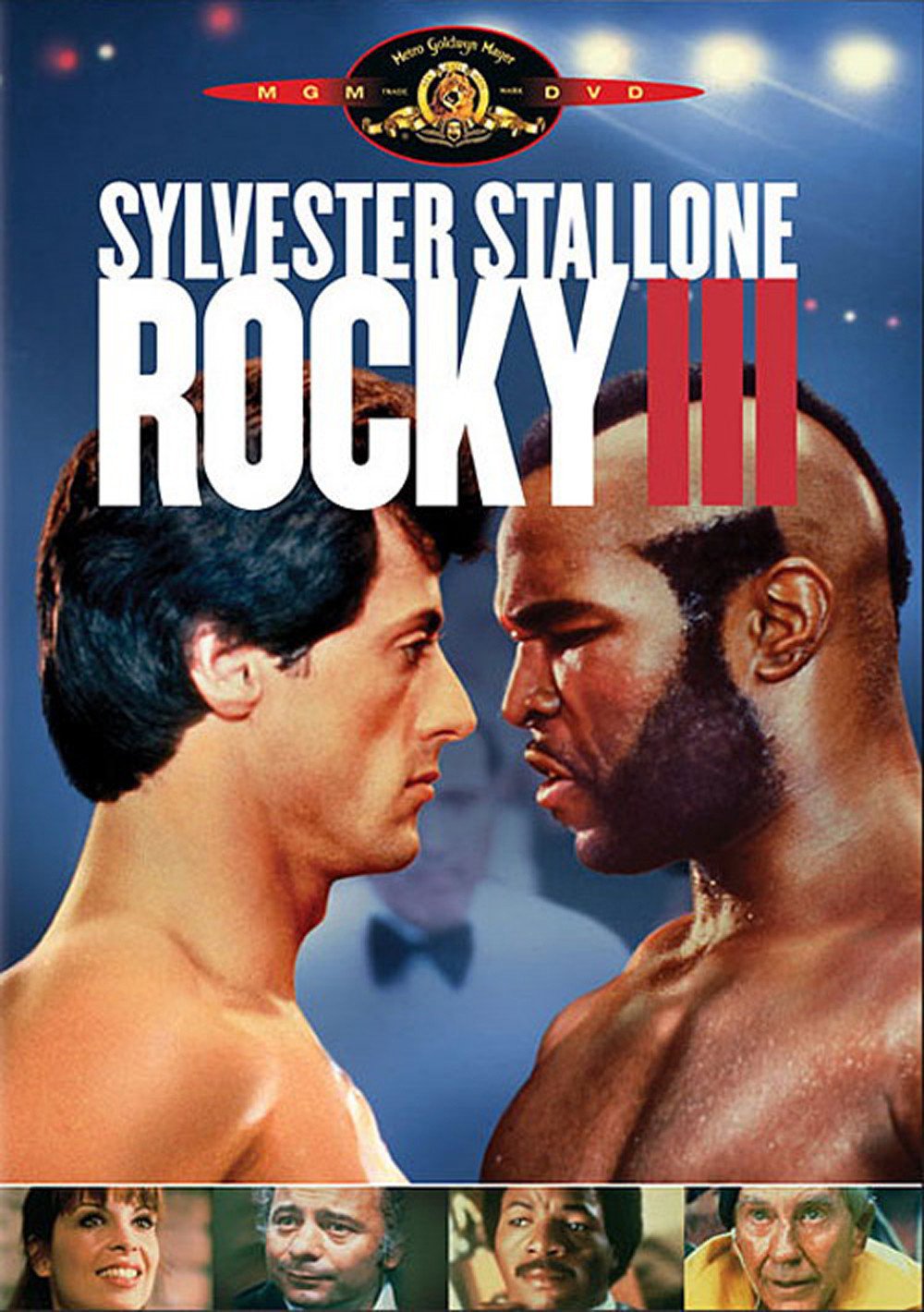
The difference between Rocky II and Rocky III is akin to the difference between a Bond film starring Sean Connery and one starring Roger Moore. The look and style and atmosphere of the series completely changed with the third installment, going for a far broader, more muscular feel that has little of the street-smarts of the first two films and none of the warmth. The film is actually an interesting commentary on where Stallone’s career was at the time – having tried and failed to establish himself as a leading man in prestige dramas, he found himself pigeon-holed in breezy ‘80s action movies, just as Rocky found himself softened by wealth and victory (“You trade your passion for glooory!” as we hear so often during the film’s many uses of ‘Eye of the Tiger’). Look, it is by no means a bad film. It is terrific entertainment for a hungover Saturday afternoon, Mr. T is a terrific moustache-twirling villain and Carl Weathers gives his best Apollo Creed performance as he returns to train Rocky back to defeat the monstrous Clubber Lang. Also, Stallone looks INCREDIBLE – the film’s many montages seem solely-designed just to show how ripped, cut, shredded and generally exploded the man’s body is. There’s even an entire standalone sequence of the film where Rocky battles Hulk Hogan, which (I’m told) paved the path for the mainstream appeal of professional wrestling in the 1990s. It’s just that for the first time in the series, it seems like ‘business as usual’. There’s never any doubt that Rocky will emerge victorious by the film’s end. In Rocky I and II our hero is beaten and near-death at the end of both fights and is wrought with emotion. At the end of Rocky III, Adrian asks him if he’s okay and he just shrugs “Never better!”.
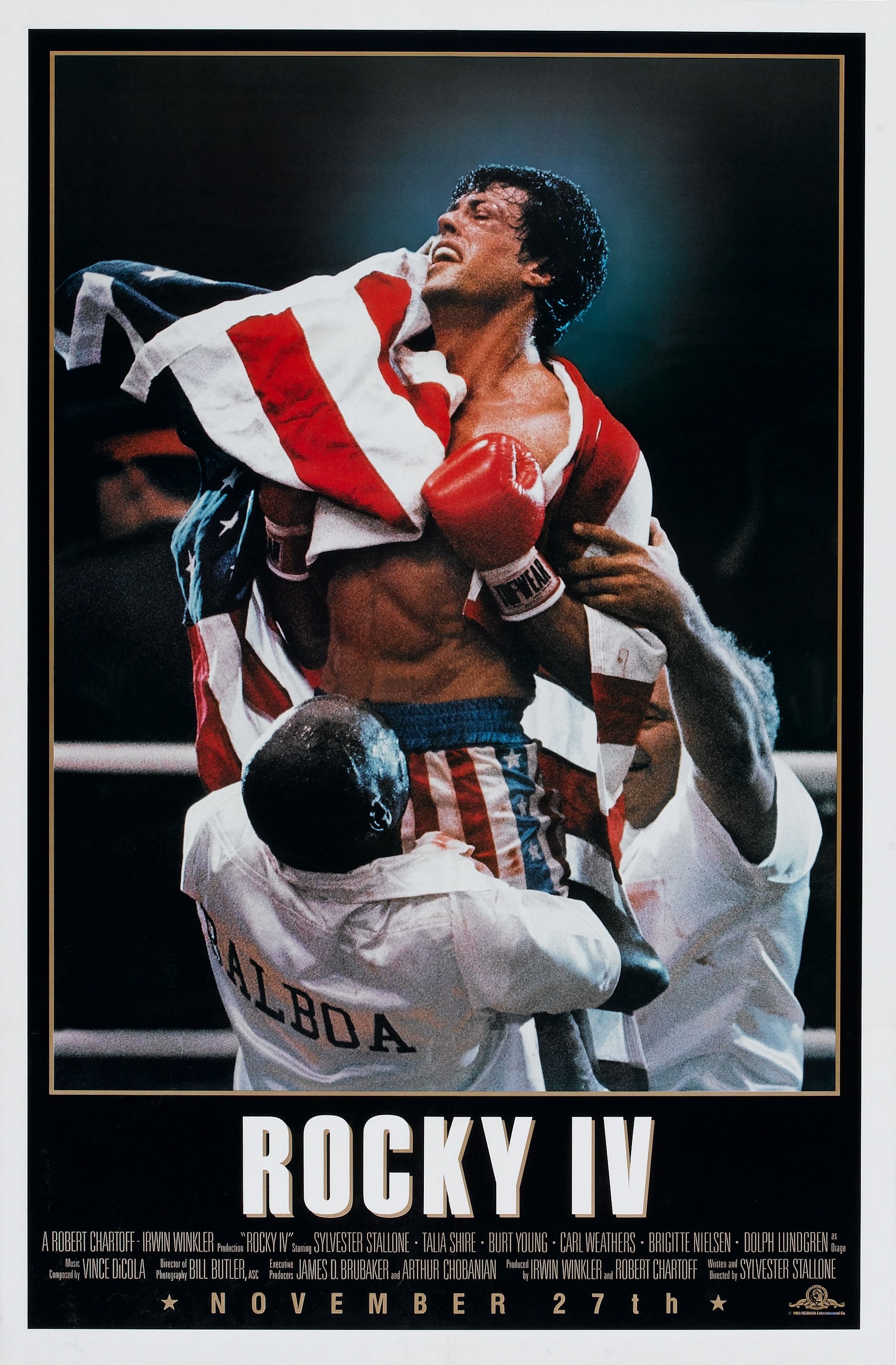
If Rocky III was a silly cartoon, then Rocky IV is an outright superheroic farce. It not only jumps the shark, it squats, deadlifts and bench-presses it atop a snowy mountain surrounded by 80s synth-metal. There’s a reason it has its own unique ‘so-bad-it’s-good’ cult following that exists completely independent of the rest of the series. The whole thing is just ridiculous, from Paulie getting a robot wife (?!) to the Soviet Empire entering the world of professional boxing, to Ivan Drago having enough super-steroid-strength to shatter a Volkswagen, to Apollo dying in the ring (I’m not spoiling anything, it’s in the film’s trailer) to Rocky shouting ‘Draaaagggooo!’ at the top of a Russian mountain (probably in Vancouver) to the film’s full 25 minutes of montages. Once again it’s hard to deny the entertainment value, once again Stallone ups the ante in terms of his own physicality (his full-body sit-ups are a sight to behold) and the baller 80s soundtrack is awesome (the song ‘Burning Heart’ literally describes the film’s plot). The film concludes with a ridiculous speech by Rocky Balboa (a prizefighter from Philly) preaching about change as the Politburo give him a standing ovation. Given how much the new film Creed references Apollo’s death in this film (again, in the trailer), it’s hilarious to think of the amount of new fans who are going to leave the new film thinking “Gee, I must check out the movie where Apollo Creed dies in the ring!” only to sit down to Rocky IV.
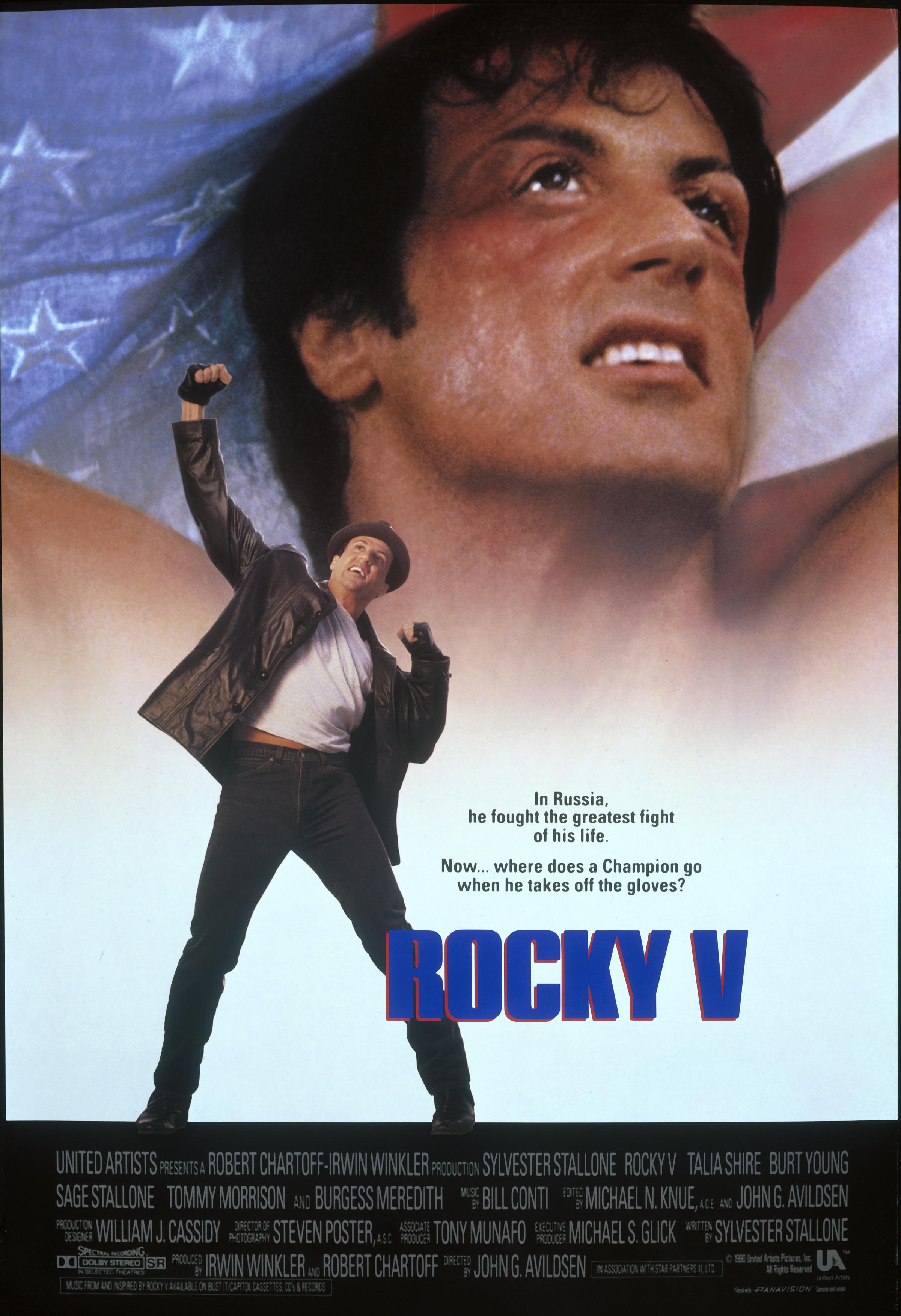
Rocky V is understandably regarded as the nadir of the franchise and one would be forgiven for calling it so. The film is undoubtedly weak, generally uninspired and the attempt to bring Rocky back down to Earth after the preposterousness of Rocky IV ends up being even more jarring tonal shift than the stylistic change that occurred between II and III. But this is the first time since the second film that series-screenwriter Stallone seemed to have been attempting something akin to the emotional resonance of the first and second films. ‘V’ sees Rocky returning to the mean streets of Philadelphia after brain injuries and shyster accountants have washed away his wealth and glory and most importantly, his ability to continue his fighting career. The ensuing fourteen years haven’t been kind to the place and the lifestyle re-adjustment takes its toll on Rocky, his family and his relationship with his curiously teenaged son Robert/Rocky Jr (played impressively enough by the late Sage Stallone that you forgive the fact that Rocky Jr’s age has multiplied between films). The film is wrought with that awful early 90s ‘Attitude!!’ with a woeful rap soundtrack, dialogue like “For an Italian kid, you sure have a nice butt!” and far too many gags at the expense of Rocky and Paulie’s limited intelligence. The film also promotes the uncomfortable message that actually, yes, violence solves everything! Rocky Jr dispatches a schoolyard bully with a few quick uppercuts and the film ends with a near-unwatchable street brawl between Rocky Sr and his corrupted protégé, real-life boxer Tommy ‘the Machine’ Gunn. However, the film has its saving graces – there’s an absolutely heartbreaking Burgess Meredith flashback, the chemistry between the two Stallones actually feels quite genuine when it could have been saccharine and while it’s a bit of a downer, bringing Rocky back to Philly ended up paving the path for the best sequels in the franchise.
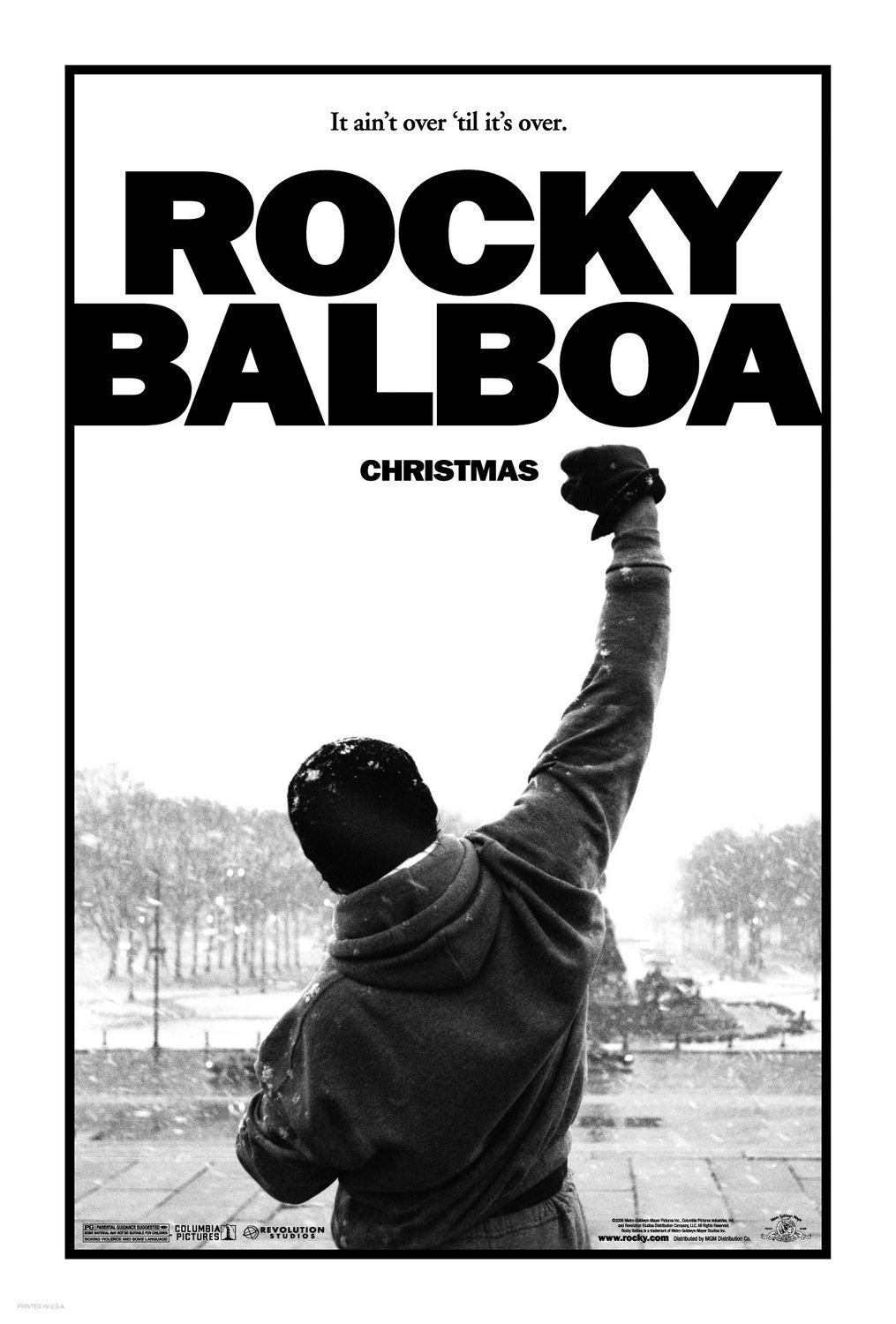
Rocky Balboa is a return to form for its lead character, the series in general and ultimately, Sylvester Stallone as a serious actor. Where the fifth film failed to generate a convincing emotional connection with the earlier films, Balboa succeeds with flying colours. Nobody is going to argue that a 50-something Rocky Balboa re-entering the ring isn’t far-fetched, but if you’re willing to suspend disbelief that our hero can overcome stiff joints with his heart, courage, determination and impassioned speeches about how you must “Keep moving forward!” despite how much life tries to knock you down, you’re in for a great time. Stallone wisely resurrected ‘The Rocky Formula’ for this film and this time, Adrian is the unlucky sacrificial lamb that has to be dead so Rocky can be sad at the start of the film. However, unlike Mickey’s heart attack or Apollo’s brutal beating, Adrian has been gone for some time and her absence from Rocky’s life is more poignant than the formulaic assassination of the other two characters. Talia Shire never appears in the film outside of stock footage, but to the credit of Stallone’s acting (and in fairness, his direction) her presence is always felt and we truly mourn her loss. Additionally, real-life heavyweight champion Antonio Tarver’s anti-antagonist recalls the three-dimensional examination given to Apollo Creed in the earlier films, as opposed to the cartoon monsters of Clubber Lang and Ivan Drago. The film’s one and only fight scene in the climax of the film is one of the series’ most impressive, feeling far more realistic even in spite of Stallone’s advanced age. Again like the earlier films, the schmaltz won’t be for everyone, but unlike the later ones, the honesty and the passion Stallone had for this film is evident on screen and it’s a great love-letter to his most beloved character.
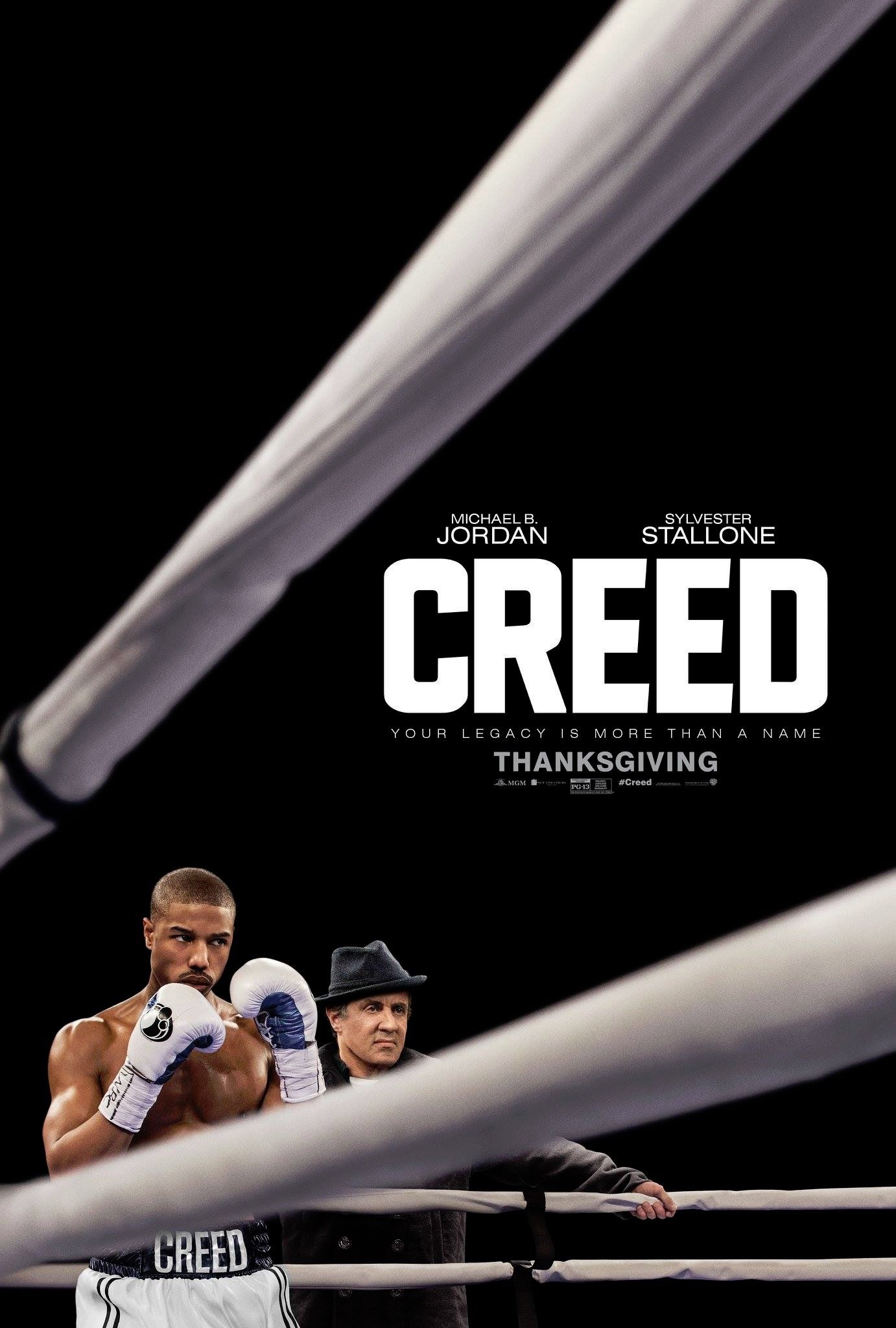
If Balboa was an embrace of the earlier films, then Creed is a shout-out to the whole series. Unlike Stallone himself, director Ryan Coogler is clearly just as much of a fan of the sillier entries of the series, but manages to maintain a no-nonsense approach in what is an absolutely fantastic reignition of the franchise. For so many years I dreaded the seemingly-inevitable remake of Rocky starring some kind of Joe Manganiello-flavoured impostor to the Stallone Throne. What a delight to report that Creed is nothing of the kind. It plunges its boxing-gloved fists into the mythology of the series, combining the macho musculature of the 1980s sequels with the real-world indie feel of the original film. Michael B. Jordan’s performance as Adonis ‘Hollywood’ Johnson (née Creed) is utterly enchanting – it’s impossible not to like this guy and despite the deus ex machina of his origins (illegitimate child of Apollo Creed conceived between films and born after Apollo’s untimely demise), he convincingly carries the weight of his father’s legacy. He even looks like Carl Weathers in certain scenes. The film’s numerous fight scenes are staggeringly well-shot (especially for a film that had less than a fifth of the budget of most franchise blockbusters) including one in particular that seems to have been shot in one single-take (a film-making technique as popular in the 2010s as the rock-music montage was in the 1980s). When Adonis gets knocked to the ground, the camera falls down with him, giving the viewer a sense of the dizzy inertia of getting pummelled in the kisser. While the film does employ bits and bobs of ‘The Formula’, it never seems enslaved to it and while the familiar Rocky themes are applied to some of Adonis’ scenes, he also has his own theme tune with its own unique flavour that is just as hummable as you leave the cinema. However, the film’s coup de grace is undeniably the return of Rocky Balboa himself, played never more convincingly by Sylvester Stallone. The film marks the first time that Stallone neither wrote nor directed a Rocky film and perhaps it was this unfettered freedom that allowed him to focus entirely on his performance. His chemistry with Jordan is flawless of course, but it’s when Rocky becomes incapacitated by illness that Stallone really stretches himself as an actor. It’s these scenes that give Rocky’s return meaning – otherwise it would have just diluted the effectiveness of him walking into the sunset at the end of Balboa. By seeing him on his knees, being carried to the toilet by his new protégé, we realise how much he meant to us in all of those other instalments. To borrow the kind of syrup these films typically employ – seeing the Italian Stallion as weak as a puppy makes us realise that it was his heart we loved so much, not his muscles.
There are flaws here and there, but ultimately Creed was a spectacular finish to a splendid Saturday that spanned 40 years of film making. Where Balboa provided a fitting send-off for the series, Creed represents a bold new beginning. And I’ll be there ‘til the bell rings at the end of the last round.
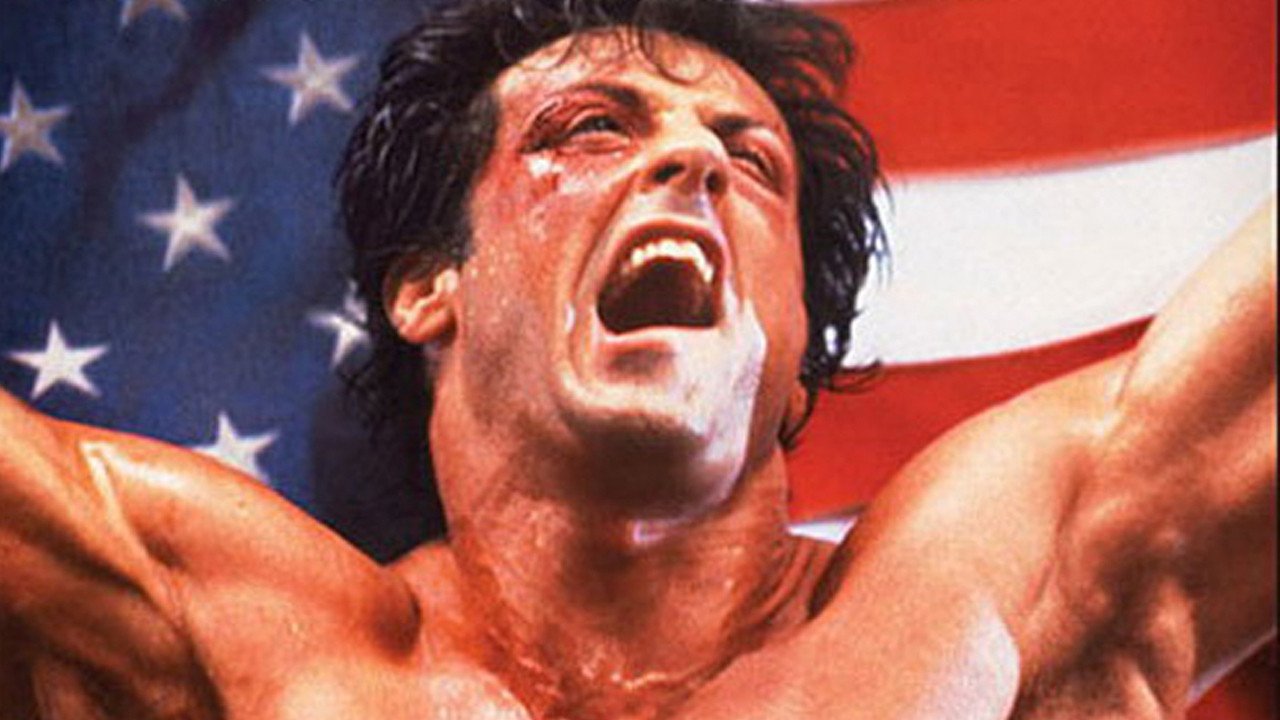 Featured Image Credit Source
Featured Image Credit Source

